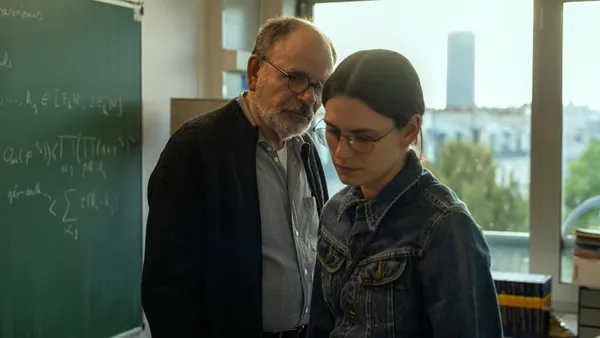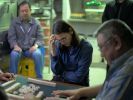Eye For Film >> Movies >> Marguerite's Theorem (2023) Film Review
Marguerite's Theorem
Reviewed by: Anne-Katrin Titze

Anna Novion’s Marguerite's Theorem (Le théorème de Marguerite), co-written with Agnès Feuvre, Marie-Stéphane Imbert, and Mathieu Robin, stars Ella Rumpf (Julia Ducournau’s Raw) as Marguerite Hoffmann, PhD student of mathematics at the prestigious École Normale Supérieure in Paris and Jean-Pierre Darroussin (unforgettable since Cédric Kahn’s Red Lights) as her professor, Laurent Werner. The film had its world premiere at the 2023 Cannes Film Festival.
Maths formulae written in chalk and with urgency on a blackboard, followed by a quick edit to the most serious face of a scientist or two have been the fodder of spy movies for the past century. Alfred Hitchcock in Torn Curtain made it particularly tongue-in-cheek and sexy with Paul Newman’s Cold War quest traversing East Germany in 1966.

Marguerite’s Theorem is decidedly not a thriller with secret agents, but the profile of a 25-year-old obsessed with maths, who, in a world dominated by men, has some secret growing-up to do.
“How long will this take?” “Not long, just a quick profile of you.” This dialogue we hear at the very start of the movie introduces us to the heroine via the time-saving shortcut of an interview for the student newsletter. The exposition is not very subtle but gives us all the background needed.
Marguerite wants to be a research professor here and is working on the Goldbach Theorem, one of the oldest unsolved problems in number theory, proposed in 1742. This is her, and many a mathematician’s, holy grail. It is the golden brook that flows throughout the film.
She wears house slippers for the interview, a sure sign that vanity is not her vice and that worldliness is not her strength (although, one could add that UGG’s Tasman slippers, an exact copy of what the more grandmotherly of my grandmothers used to wear in her eighties, is a big trend now for college students in Manhattan).
Marguerite’s glasses and backpack and her prettiness make her almost a stereotype. When asked about other passions besides maths, she mentions walking, because it helps her think. The trajectory is clear. She is one of very few female students, the professor’s star pupil present to enlighten the class. There is an all-important conference in Lausanne looming and when Werner introduces Lucas Savelli (Julien Frison), a student who just returned from Oxford, working on the same subject, Marguerite smells serious competition and is not happy.
“Three brains are better than two,” says the professor, giving himself an air of selflessness that hides his own voracious ambition. The two postgrads exchange glances, Marguerite adjusts her glasses. Something’s gotta give, so much is clear.
Lukas plays the trombone in the school band. Marguerite talks to her mother (Clotilde Courau) on the phone about her upcoming presentation on Szemerédi's theorem from the 1970s. On the big day, writing the conjecture on the board in the lecture hall, Lucas interrupts her from the audience with a question that, to the shock of Werner et al, invalidates her entire proof. This is a disaster and she runs from the room. This catastrophe, undermining three years of work, changes everything and the second part of the film sees new trials and tribulations in store for her.
A rigged lipstick colour survey incident introduces her to Noa (Sonia Bonny), a dancer who will soon become her roommate and confidante. Marguerite discovers her talent for professional Mahjong. Very profitable, “it’s illegal, but no more than poker,” she tells her concerned mother during a visit. Maths cannot be so easily exorcised, walls painted black make for good problem-solving surfaces, teamwork may not be so bad, and old anxieties about infinity are dressed anew.
When Marguerite discovers a sheet of paper with the Goldbach pyramid on the floor in her childhood home, she has an idea. This is the science equivalent of the Coco-Chanel-sees-a-sailor-in-a-striped-shirt moment of artistic inspiration. Can she be a maths genius and an emotionally functioning human being while also female? You bet!
Reviewed on: 24 May 2023















